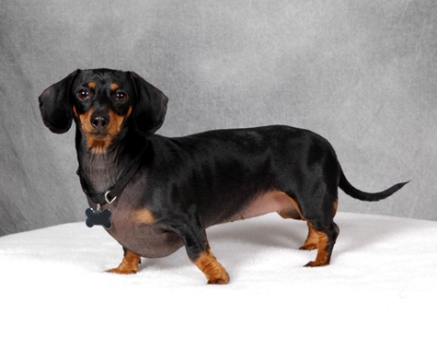
Not human bean, more than a human been!
 Backbone
Backbone
Dachshunds are prone to spinal disc problems, also known as Dachshund
paralysis. This is due to their very long spinal columns and
 very short
rib cages. Dogs with this problem can become completely paralyzed. For
this reason, it's important that your dog be trained early on not to
jump, as jumping puts additional pressure on the spine. You should also
be taught how to hold your dog properly, as improper handling can lead
to back problems, too. Some veterinarians caution against Dachshunds
using stairs, though most feel that it does not pose a problem for the
dog to use stairs, as long as they are walking instead of running.
Researchers are finding that the occurrence and severity of these spinal
disc problems are hereditary in large part, so it's important to inquire
about such problems from your breeder.
very short
rib cages. Dogs with this problem can become completely paralyzed. For
this reason, it's important that your dog be trained early on not to
jump, as jumping puts additional pressure on the spine. You should also
be taught how to hold your dog properly, as improper handling can lead
to back problems, too. Some veterinarians caution against Dachshunds
using stairs, though most feel that it does not pose a problem for the
dog to use stairs, as long as they are walking instead of running.
Researchers are finding that the occurrence and severity of these spinal
disc problems are hereditary in large part, so it's important to inquire
about such problems from your breeder.
 Back
problems
Back
problems

As it has become increasingly apparent that the occurrence and severity of these spinal problems, or intervertebral disk disease, is largely hereditary, responsible breeders are working to eliminate this characteristic in the breed. Treatment consists of various combinations of crate confinement and courses of anti-inflammatory medications (steroids and non-steroidal anti-inflammatory drugs like carprofen and meloxicam). Serious cases may require surgery to remove the troublesome disk contents. Others may need the aid of cart to get around if paralysis occurs.
A new minimally-invasive procedure called "percutaneous laser disk ablation" has been developed at the Oklahoma State University Veterinary Hospital. Originally, the procedure was used in clinical trials only on dachshunds that had suffered previous back incidents. Since dachshunds are the poster children of dogs with back issues, the goal is to expand this treatment to dogs in a normal population.
In addition to back problems, the breed is also prone to patellar luxation.
